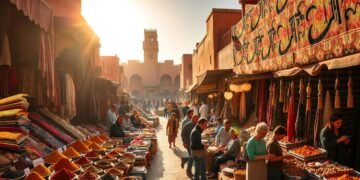Ashura, also known as the Day of Ashura, is a significant cultural celebration in Morocco that takes place on the 10th of Muharram, the first month of the Islamic calendar. This day is marked as a day of mourning and remembrance for the martyrdom of Imam Hussain, the grandson of Prophet Muhammad, and his companions in the Battle of Karbala.
However, despite its solemn origins, Ashura has become a celebration of the resilience and bravery of the Imam and his companions. It is a joyous event that is celebrated with great zeal and fervor across Morocco, particularly in cities like Marrakesh, Fez, and Casablanca.
The History of Ashura in Morocco
The history of Ashura in Morocco dates back to the 16th century, when Moroccan scholars and Sufi saints brought the celebration to the country. Over time, the celebration has become an integral part of Morocco’s rich cultural heritage, and it is widely celebrated.
In the past, Ashura was primarily celebrated by religious leaders and scholars, but today it is a celebration that is enjoyed by people of all ages and backgrounds. During the celebration, people come together to participate in religious ceremonies, perform traditional parades, and offer special prayers for peace and prosperity.
The Significance of Ashura in Morocco
Ashura holds a significant place in Morocco’s cultural and religious landscape. It is seen as a time of renewal and reflection, and it provides an opportunity for people to reflect on the values of courage, sacrifice, and resilience that were embodied by Imam Hussain and his companions.
For many Moroccans, Ashura is also a time to reflect on their own lives and to make a commitment to live their lives. It is a time to recommit to the values of justice, equality, and compassion that are central to the Islamic faith.
The Joyful Celebrations of Ashura in Morocco
Despite the solemnity of the occasion, Ashura is celebrated with great joy and excitement in Morocco. The festival is an opportunity for the local communities to come together and celebrate their shared cultural heritage and religious beliefs. The celebrations are characterized by a festive atmosphere, with music, dancing, and feasting.
In addition to the street parades, the festival is also marked by the preparation of special foods, such as sweets, pastries, and dry fruits [fakia), that are shared among the community. The event is also an opportunity for local merchants to showcase their wares, with stalls selling traditional crafts and dresses.
Last but not least
In conclusion, Ashura is a celebration of significant importance in Morocco, and it is a celebration that brings people together to reflect on the values of courage, sacrifice, and resilience. Whether you are a religious person or simply someone who appreciates the richness of Morocco’s cultural heritage, the Ashura celebrations are a must-see event. So why not plan your next trip to Morocco during the Ashura celebrations and experience this rich cultural celebration for yourself?


























